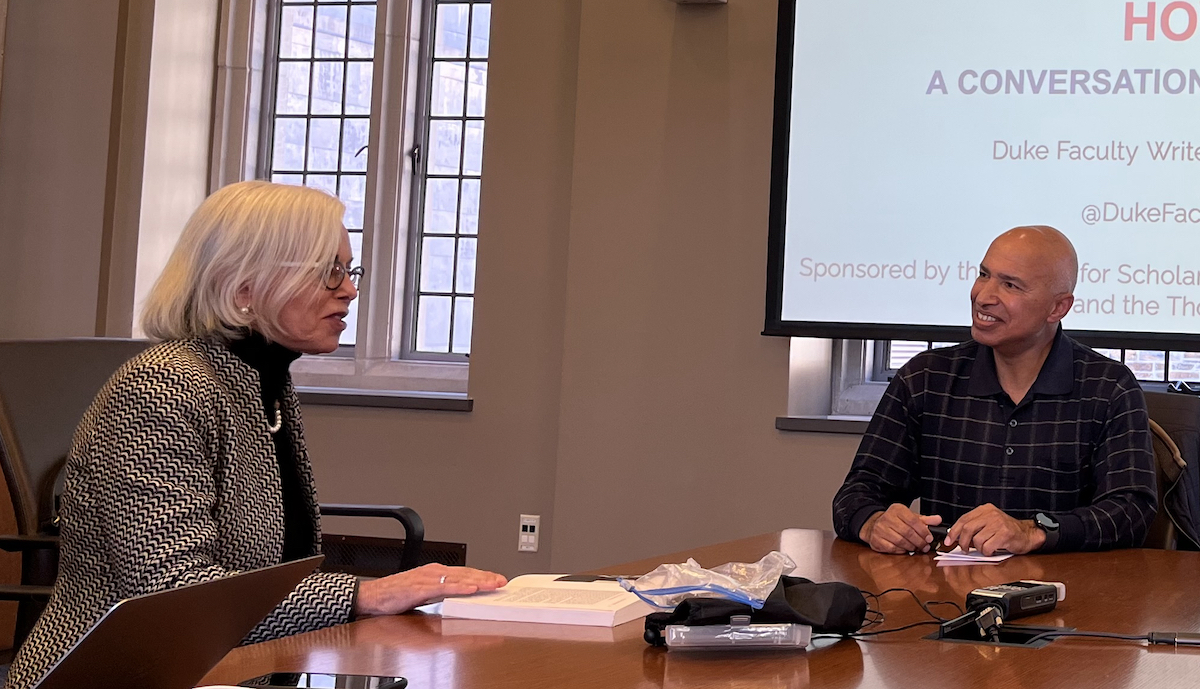Abbas Benmamoun on his writing practice
February 22, 2023
On Friday, January 27, Jennifer Ahern-Dodson, Director of Duke’s Faculty Write program, conducted an in-person interview with Vice Provost for Faculty Advancement Abbas Benmamoun in the “How I Write” series. It was an insightful discussion about the challenges of balancing the demands of administrative work with the desire to continue scholarly writing.
By Sylvia Miller, Senior Program Manager, Scholarly Publishing and Special Projects, John Hope Franklin Humanities Institute

Phrases and sentences and how they work, how children acquire knowledge of linguistic structures, the nature of linguistic variation, and the core that languages share—these are some of the themes that fascinate Abbas Benmamoun as he studies classical and spoken varieties of Arabic and compares them to other languages.
As Duke’s Vice Provost for Faculty Advancement, Abbas exudes kind confidence about recruiting and hiring, promotion and tenure, and faculty and leadership development. But ask him about his scholarship, and you will see him light up in a new way. In his “How I Write” interview with Jennifer Ahern-Dodson on January 27, 2023, it was clear that he has a passion for the study of linguistics, first sparked by his love of classical Arabic poetry. “I cannot do administration without doing linguistics,” he admitted.
Balancing Act and the Long View
It’s a classic case of competing priorities. How does Abbas continue to publish scholarly work while serving as a Vice Provost? Unlike in the sciences, where you cannot close your lab periodically and expect to keep up with your experiments, “in the humanities and to some degree in the social sciences you may be able to keep your interest alive,” Abbas explained, “but you have to be really smart, intentional, strategic about it, and you also have to be honest with yourself that you are not going to be able to go to all those conferences and write all those articles that you want to write.” For this reason, “I have become very selective in what I take on.”
Taking a long view of scholarship helps in choosing quality over quantity. Abbas sees human knowledge as cumulative over time. He focuses on writing something that will move his field forward; it might not completely solve a problem of language that he is exploring, but it will contribute to a larger story.
Holding this long perspective in mind comes naturally out of his formative years in Morocco, where he enjoyed a broad humanistic education including Western philosophy and Islamic philosophy. “I really enjoyed that kind of education,” he said. “I try to read about linguistics, anthropology, sociology, psychology; all can inform how you are thinking about language. To be able to broaden your perspective in order to inform the narrow problem that you are doing is something I try to share with students.”
Writing in Spurts and Writing in Your Head
Abbas admitted that he does not easily pivot from administrative work to writing and back again. He prefers to write at home, surrounded by his books and notes. “I write in spurts,” he said. “I am not the person to write a piece and come back to it later; when I sit down to write I really sit down to write.”
Clearly, he is not one to stare disheartened at a blank page. Despite a limited time devoted to writing, he explained, “you can still be thinking about the problem and testing solutions in your head: I always have a kind of structure about what I want to say, here is how I want to go about writing about this problem. When I sit down to write, then I can write. Maybe that’s not something that would work for everyone!”
He ruminates on questions that puzzle and fascinate him: “Why is that happening in that language, why is that verb interacting with the subject, why are elements codependent, why are they interacting in that particular way?” In sum, “it’s like you are not writing but you are writing in your head.”
Back to Earth: Walking Away or Collaborating
Lest Abbas’s writing process conjure images of Milton dictating Paradise Lost to his daughter in polished iambic pentameter or Mozart dashing off brilliant music that he had already composed in his head – capacities and habits of mind perhaps too daunting for many to emulate – a couple of practical questions from Jennifer brought the conversation back to earth.
“What happens when you get stuck in a writing project?” she wanted to know.
“It depends on the stage of your career,” he answered, speaking sympathetically of junior scholars who naturally find getting stuck in their writing “really scary.” Without having the pressure that junior faculty have, a “luxury” he appreciates, he finds that “it’s good to have more than one thing going on.” If he doubts his idea, or wonders, “Is this really interesting?” he has learned to put the project on the back burner and move on to something else, or even cut his losses and walk away.
“What about collaboration?” Jennifer asked. This question sparked an intriguing description of division of labor and accountability. Abbas often participates in designing a linguistic study for which others may be in a better position to collect data; later he helps to analyze and interpret the resulting data and then decides together with his collaborators who will write which part of an article. While it can be challenging to “hold your end of the bargain,” it is helpful to be “accountable to other people to do your part.”
In a long view, perhaps collaboration is another way to emulate the Arabic poets of the early 20th century in the diaspora, who formed a group called The Circle of Pens. I

An audience member shares a book of Arabic poetry with Abbas Benmamoun.
****
About the How I Write series: Developed by Jennifer Ahern-Dodson for the Faculty Write program, the “How I Write” series centers our own writing stories as academics: How we write, why we write, what we do when we struggle, and what sustains us. In small group forums, participants exchange ideas about writing, share strategies for writing and publishing, and ultimately dispel myths about how writing “should” happen (like scribbling alone in the attic), by talking frankly about how it does. Ultimately, “How I Write” conversations offer an opportunity for us to learn from each other. To connect and to build community around a shared experience—writing.
check us out
on social media